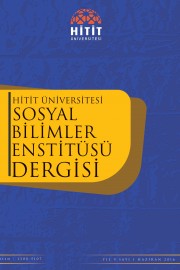Aile Katılımı Ve Sosyal Beceri Eğitimi Programlarının Tek Başına Ve Birlikte 4-5 Yaş Çocuklarının Sosyal Becerileri Üzerindeki Etkisinin İncelenmesi
The Effects of Alone and Joint The Social Skills Education and Family Participation Programmes on
4-5 Years Old Children’s Social Skills and Mother-Child Relationship
Author(s): İlkay Göktaş, Hülya Gülay OgelmanSubject(s): Social Sciences, Education, Family and social welfare
Published by: Hitit Üniversitesi Sosyal Bilimler Enstitüsü
Keywords: Parents participation; preschool children; social skills; social skills education;
Summary/Abstract: The aim of this research was to determine effect alone and joint and Family Participation and The Social Skills Education Programmes on 4-5 years old children’s social skills. This research was designed as a quasi experimental study. During the research pre-test, past-test and follow-up test is used to collect accurate data. The work group of this research was consisted of for subgroups; Experimenal Group1 (the group that The Family Participation Activity is applied), Experimantal Group2 (The group that The Social Skills Education Programme is applied), Experimantal Group3 (The group that The Social Skills Education Programme With Family Participation is applied) and control group (the none of this programmes are applied). Experimantal Group1 there are 34 children, 34 mothers, 34 fathers, in the Experimantal Group2 there are 32 children, Experimantal Gruoup3 there are 30 children, 30 mothers, 30 fathers, in the Control Group there are 32 children, 32 mothers, 32 fathers. During this research; Personal Information Form, Child-Parent Relationship Scale (Mother Form) and Social Skills Evaluation Scales are used as a data collection tools. According to the results of this research, Social Skills Education Programme With Family Participation in Experimantal Group3; social skills education programme in Experimantal Group2; The Family Participation Activity in Experimantal Group1 for 4-5 year of children’s social skills (interpersonal skills, controlling the anger behaviour and the abilities of adapting to changes, coping with the peer pressure, controlling himself, verbal description, accepting the results, listening, creating aim, completing the tasks) are an significant effect (p<.01).
Journal: Hitit Üniversitesi Sosyal Bilimler Enstitüsü Dergisi
- Issue Year: 9/2016
- Issue No: 1
- Page Range: 417-439
- Page Count: 23
- Language: Turkish

